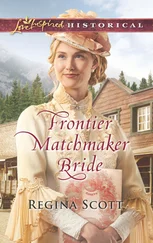She loved it when he quoted the old poets such as Keats. Clayton Howard knew all the ways to turn a phrase and take away her objections. But this time, instead of sweeping her away, his touch raised a panic.
She’d just come into her own. She was somebody. How could he ask her to leave?
She pushed him back. “Clay, be reasonable. Everyone knows there’s nothing but wilderness and savages beyond the Adirondacks. Boston society is the best in the nation. If you’d just try a little harder, I’m sure you could fit in.”
“That’s the problem,” he said, his warm voice cooling. “I don’t want to fit in, Allegra. I want more. I thought you’d want more, too.”
She could not imagine what more there might be. Boston ladies married well, bore children, entertained family and friends, supported worthy causes. How could she do that from some backwoods hovel?
“There now,” she’d said as if soothing a petulant child. “I’m sure we can discuss this another time when we’ve both had a chance to think about it.” She’d linked her arm with his. “They should be playing a polka soon. I know you like that dance.”
He’d touched her face with his free hand, fingers tracing the curve of her cheek. “I would take any opportunity to dance with you, Allegra. My feelings won’t change.”
She’d thought he meant his devotion to her would never change. But two days later, he’d left Boston, and she hadn’t set eyes on him again until they’d met on the pier. It seemed Clayton Howard’s devotion was to his future, not theirs. Her parents and his had encouraged her to swallow her disappointment and marry Frank. Frank, who had never argued with her, who had been her dear friend as long as she could remember. And so a month later, she and Frank had wed amid the smiling approval of Boston society, a society she could no longer abide.
She didn’t remember reaching the bottom of the stairs. The touch of Clay’s hand on her arm drew her up.
“Be reasonable, Allegra,” he murmured, offering a smile that would once have set her to blushing. “I have no intention of being an annoyance. But I think we both agree it’s my duty to protect you.”
“Duty?” Allie shook her head. “This journey was my choice, sir. You have no duty to protect me from my future. I can handle myself on the frontier. You forget, my ancestors civilized Boston.”
Clay snorted, dropping her arm. “Is that your reason for going? You think the fine citizens of Seattle need to be civilized? There isn’t a fellow in the territory who will thank you for it.”
“On the contrary,” Allie insisted. “Mr. Mercer assured us that we will be welcome additions to the city, serving to bring it to its full potential. He, sir, has a vision.”
Clay rolled his eyes. “Spare me. I’ve spent the last hour watching how easily Mercer’s plans fell apart. No one seemed to know who had paid and who hadn’t. It wouldn’t surprise me if Mercer had skipped town with your money. You’ve been duped, Allegra. Admit it.”
Anger was pushing up inside her again. Why were her ideas never taken seriously? Why was she always the one who had to bend to another’s insistence?
“Just because you dream small, Clay Howard,” she told him, “doesn’t mean other men have the same narrow vision. And neither do I. I will pay you back every penny, I will allow you to spend time with Gillian, but I won’t listen to another word against our plans. Do I make myself clear, sir?”
Any Boston gentleman who had borne the brunt of her anger would have begged her pardon, immediately and profusely. Clay merely lowered his head until his gaze was level with hers. Something fierce leaped behind the cool green.
“Don’t expect me to jump when you snap your fingers, Allegra,” he said. “I paid your passage because this trip seems to be important to you. But I won’t nod in agreement like a milk cow to everything you say. I’ve been to Seattle. I know the dangers of the frontier. I owe it to Frank to protect you from them.”
As if in agreement, the Continental shuddered, and a deep throb pulsed up through the deck. Allie was tumbling forward, her feet not her own. She landed against something firm and solid—Clay.
His arms came around her, and she found herself against his chest. His gaze met hers, seemed to warm, to draw her in. She couldn’t catch her breath. Once, she’d dreamed of his embrace, his kiss.
Heat flared in her cheeks at the memory, and she pulled herself out of his arms. “You owe Frank nothing, Clay Howard. And you owe me less. If you insist on coming to Seattle with us, you’d better remember that.”
Chapter Four
Clay paused while Allegra continued into the salon. In truth, he felt as if the jolt of the ship starting forward had knocked some of the breath out of him. It had been a long time since he’d held Allegra in his arms, and, for the sake of his sanity, it ought never to happen again. Hadn’t he learned by now that he was no match for Boston society?
In fact, it was the suffocating chill of Boston high society that had driven him west, far from everything he’d ever known. He couldn’t regret it. He’d climbed mountains, tops shimmering with snow, ten times the size of Beacon Hill. He’d crossed rivers wider than the Charles and more swiftly flowing. He’d met Indian chiefs with as much pride as his late father, lady prospectors with more presence than his mother. Riding across the vast prairies, he’d realized how small he was and how big the God he served.
It was God’s urging that had propelled him back to Boston when Clay had received the letter telling him about Frank’s death. Like the prodigal son, he’d come to make amends. He wanted to explain to his mother why he’d left, to make sure Allegra was doing all right with Frank gone. He’d taken a room at Boston’s finest hotel, Parker’s; bought a new suit of clothes; even hired a carriage to take him to his family home.
No fatted calf awaited him. Though his father had died several years ago, Clay had hoped his mother would receive him. But the person waiting for him in somber black in the elegant parlor was his cousin Gerald.
“A great deal has changed since you left, cousin,” he’d said, his icy blue eyes staring across the space, every blond hair pomaded back from his narrow face. “With Frank gone, I’ve had to take up the responsibilities you refused to honor.”
Clay’s hands had fisted at the sides of his fancy suit. “I’m here now. Where’s my mother?”
“Indisposed.” Gerald had all but sneered. “And quite unwilling to see you. It is my unhappy duty to inform you of the fact.”
“She has no interest in where I’ve been?” Clay challenged. “What I’ve done?”
“None,” his cousin said. “It doesn’t matter where you’ve been. It matters that you weren’t here. We all know it should have been you in that field near Hatcher’s Run.”
Of course it should have been him. He was the oldest, the better rider, the best shot. He’d had the advantage of a year of military training in a school that specialized in turning willful boys into disciplined men. Frank hadn’t had to attend that school. Frank was the good son, obedient, a friend to all who knew him. He didn’t know why his brother had gone to war, when so many of the wealthy families paid a poorer boy to fight in their son’s stead when their son had been drafted. According to the friend who had written Clay, Frank had gone down protecting others who had been wounded, considerate even to the end.
Clay raised his head. “If you’ve accepted responsibility for my mother and Frank’s widow, I applaud you. Just know that I’m willing to help, whatever they need.”
His cousin’s tight smile was the only answer.
Читать дальше












